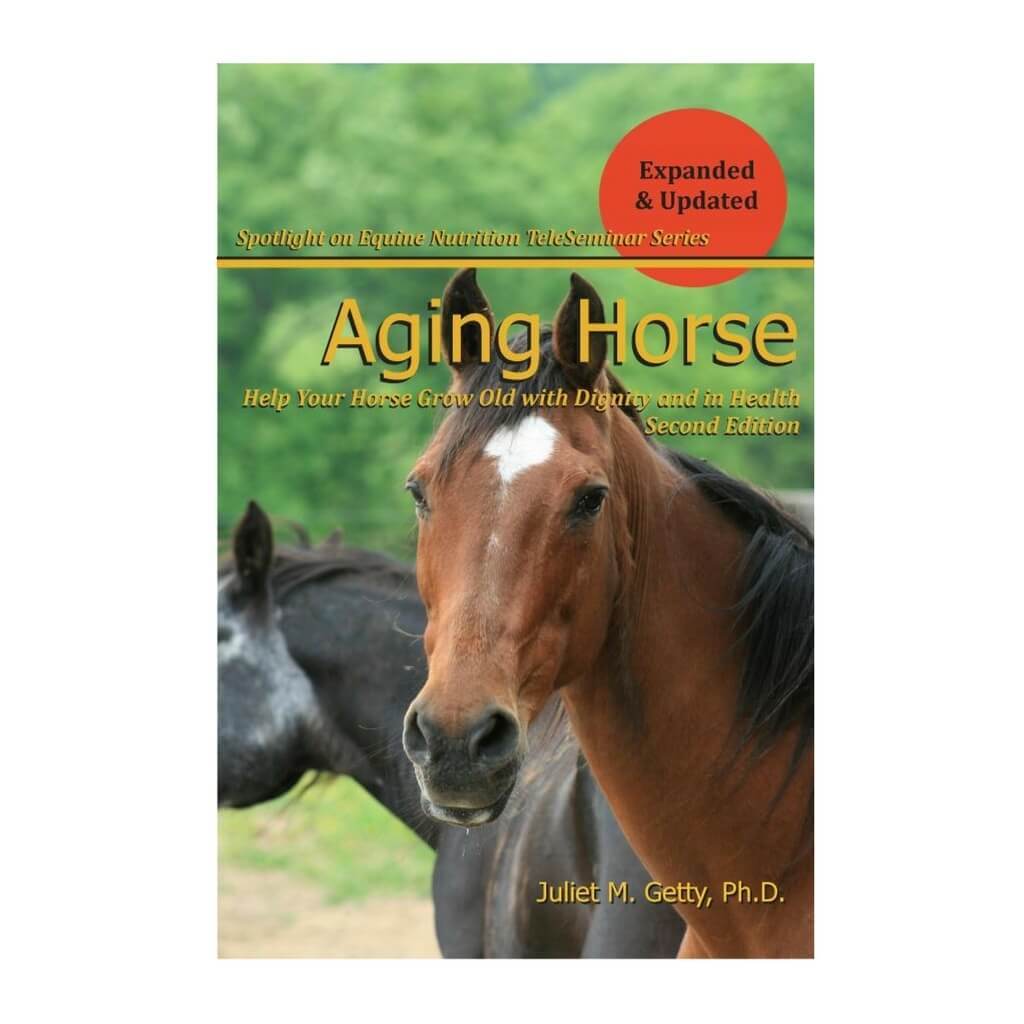-
The aged horse has so much to offer: wisdom, experience, and confidence, to name a few attributes. Helping him grow old in good health and with dignity is a gift every horse owner hopes to be able to bestow. In this expanded version, Dr. Getty covers all the elements you need to know about feeding your horse to foster his longevity and prolong his usefulness.
Highlights:
- Digestion inefficiency with age
- Changes in hindgut bacterial population
- Body composition
- Helping the underweight horse
- The obese horse
- Slowing the progression of arthritis
- Reduced liver and kidney function
- Respiratory and immune-related functions
- Guidelines, with specific supplement and nutrient suggestions
About Dr. Juliet M. Getty
Juliet M. Getty, Ph.D. is an independent equine nutritionist with a wide U.S. and international following. Her research-based approach optimizes equine health by aligning physiology and instincts with correct feeding and nutrition practices. Dr. Getty’s goal is to empower the horseperson with the knowledge to provide the best nutrition for his or her horse’s needs.
Dr. Getty is the author of the comprehensive resource, Feed Your Horse Like a Horse, as well as seven topic-centered Spotlight on Equine Nutrition series of booklets:
- Whole Foods & Alternative Feeds
- Joint Health - A Nutritional Perspective
- Aging Horse - Help Your Horse Grow Old with Dignity and in Health
- Laminitis - A Scientific and Realistic Approach
- Easy Keeper - Making it Easy to Keep Him Healthy
- Equine Cushing's Disease - Nutritional Management
- Equine Digestion - It's Decidedly Different
Save on Book Packages!
- Save $2 when you buy any 2 Spotlight Titles (mix & match)
- Save $12 when you buy all 7 Spotlight Titles
- Save $28 when you buy all 7 Spotlight Titles + Feed Your Horse Like A Horse
She also offers an informative e-newsletter, Forage for Thought. Opt-In here. Her Resource Library offers a world of useful information for the horseperson, including a library of her past articles, tips and recordings. Her Free-Shipping Store helps horse owners choose the right supplement for their horse’s specific needs.
-
Excerpt from Aging Horse: Help Your Horse Grow Old with Dignity and in Health
The Hard Keeper
Weight loss is common, but that doesn’t mean it is a normal manifestation of aging. Though the reason is often not apparent, it is important to do your best to figure out what may be leading to your horse’s loss of body fat, muscle mass, or both. The most common cause of weight loss in older horses is dental problems, as mentioned above. Liver or kidney disease can impair the horse’s ability to metabolize and hold on to nutrients, leading to loss of muscle mass. Disorders of these vital organs can be serious and should be thoroughly tested and treated both medically and through dietary means. Equine Cushing’s disease, known as pituitary pars intermedia dysfunction (PPID), if left untreated, can diminish muscle mass. The swayed back and pot belly that are often seen in older horses are not normal characteristics and can indicate more than poor muscle tone. The elevated rise in cortisol secretion from the adrenal gland causes the breakdown of muscle tissue. Digestion can be less efficient in the older horse. When this happens, the horse will absorb insufficient calories from feedstuffs and therefore show undesirable weight loss.
Obesity
Weight gain is also common, especially as horses become less active. Exercise, therefore, remains an important ingredient in your horse’s overall health. It may be a different kind of exercise, less structured, and at a slowed pace, but encouraging your horse to move will go a long way in maintaining a healthy metabolic rate and keeping the cells more sensitive to insulin. If your horse has been overweight much of his adult years, he may develop metabolic syndrome (insulin resistance) or equine Cushing’s disease (secondarily leading to insulin resistance). In either case, the resulting hormonal imbalance leads to excess fat storage, and the more fat, the more hormonal imbalance, creating a cycle of increased obesity. Do not restrict forage since this creates a hormonal response that can lead to laminitis, and ironically keeps the horse from burning fat.
Digestion Inefficiency
This is an issue that is often overlooked. We think that as long as we offer a nutritious diet, the horse will be fine. But as your horse ages, specific areas along the gastrointestinal tract lose their ability to function optimally. In the mouth, the older horse produces less saliva. This can result in less chewing. He may drop his feed (which obviously doesn’t do him any good) or he may swallow large boluses of feed, which do not have as much surface area for digestion to take place. Saliva also contains the salivary amylase enzyme which starts the digestion of starch. If inadequately chewed and mixed with saliva, much of the carbohydrate content will not be digested in the small intestine, and your horse will not get the calories needed. Plus, there is the danger of too much sugar and starch reaching the hindgut, potentially leading to colic or laminitis. Saliva also serves as a natural buffer against the continual flow of stomach acid. If saliva is diminished, your horse is at a higher risk of developing an ulcer, either in the stomach, early part of the small intestine, or further along the digestive tract.
Fiber is not digested in the small intestine, but reaches the hindgut (cecum and large colon) where the resident bacterial population produces fiber-digesting enzymes. If bacterial numbers are not sufficient, fiber cannot be adequately digested. You can feed the best hay available, but if your horse is not digesting it, he will not get the calories provided by the hay. Furthermore, these microbes are responsible for producing the B vitamins and vitamin K.


